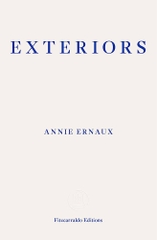Winner of the Nobel Prize in Literature 2022
Taking the form of random journal entries over the course of seven years, Exteriors concentrates on the ephemeral encounters that take place just on the periphery of a person’s lived environment. Ernaux captures the feeling of contemporary living on the outskirts of Paris: poignantly lyrical, chaotic, and strangely alive. Exteriors is in many ways the most ecstatic of Ernaux’s books – the first in which she appears largely free of the haunting personal relationships she has written about so powerfully elsewhere, and the first in which she is able to leave the past behind her.
‘I find her work extraordinary.’
— Eimear McBride, author of Strange Hotel
‘Admirable for its quiet grace as well as its audacity in a willingness to note (and thus make noteworthy) the smallest parts of life. It’s a masterclass in understatement, a quality difficult to find nowadays, in literature or life.’
— Lucy Sweeney-Byrne, Irish Times
‘Ernaux, in particular, feels unparalleled in its harnessing of memories. An acclaimed writer in her native country, her descriptions of human life are concise and they mediate our own opinions on these encounters with our own prejudices of the world.’
— Billie Ingram Sofokleous, Buzz Magazine
‘Reading her is like getting to know a friend, the way they tell you about themselves over long conversations that sometimes take years, revealing things slowly, looping back to some parts of their life over and over’
— Joanna Biggs, London Review of Books
‘The book is at once lyrical and unruly. It’s a story of fleeting encounters, overheard conversations and clear-sighted observations that will make you pay attention to the seemingly ephemeral details of ordinary life.’
— Monocle
Praise for Simple Passion
‘The triumph of Ernaux’s approach ... is to cherish commonplace emotions while elevating the banal expression of them.... A monument to passions that defy simple explanations.’
— New York Times
‘A work of lyrical precision and diamond-hard clarity.’
— New Yorker
‘All this – the suffering and anxiety of waiting, the brief soulagement of lovemaking, the lethargy and fatigue that follow, the renewal of desire, the little indignities and abjections of both obsession and abandonment – Ernaux tells with calm, almost tranquillized matter-of-factness [that] feels like determination, truth to self, clarity of purpose.’
— Washington Post
‘I devoured – not once, but twice – Fitzcarraldo’s new English edition of Simple Passion, in which the great Annie Ernaux describes the suspended animation of a love affair with a man who is not free. Every paragraph, every word, brought me closer to a state of purest yearning.’
— Rachel Cooke, Observer
‘What mesmerizes here, as elsewhere in Ernaux’s oeuvre, is the interplay between the solipsistic intensity of the material and its documentary, disinterested, almost egoless presentation. Reminiscent of the poet Denise Riley’s Time Lived, Without its Flow, a study of how grief mangles chronology, Simple Passion is a riveting investigation, in a less tragic key, into what happens to one’s experience of time in the throes of romantic obsession.’
— Lola Seaton, New Statesman
Born in 1940, Annie Ernaux grew up in Normandy, studied at Rouen University, and later taught at secondary school. From 1977 to 2000, she was a professor at the Centre National d’Enseignement par Correspondance. In 2017, Annie Ernaux was awarded the Marguerite Yourcenar Prize for her life’s work. In 2022, she was awarded the Nobel Prize in Literature.
Tanya Leslie was the first translator of Annie Ernaux into English and translated a number of her works, including A Woman’s Story (1991), A Man’s Place (1992), Simple Passion (1993), Shame (1998), I Remain in Darkness (1999) and Happening(2001).


